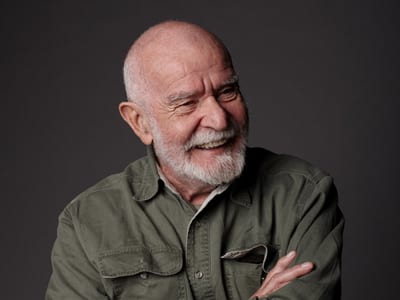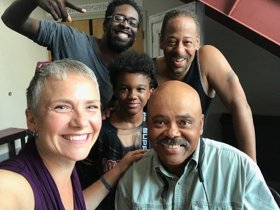Over its 30 seasons, MetroStage has had several homes, including 17 years in a cozy venue in Alexandria’s North End. Redevelopment of the area will lead MetroStage to another location in Alexandria in the near future. Before leaving its current home, however, MetroStage will celebrate its 30 seasons as Northern Virginia’s first professional theater company by presenting a season with four productions concluding in February 2019.

First up is Athol Fugard’s most recent play, The Painted Rocks at Revolver Creek. Painted Rocks is set in South Africa over a period of twenty years starting in the 1980s. It is an intimate personal saga through apartheid’s cruelty as a long-engrained way of life with humiliations carried out by the white population upon the majority black population. The ways of those times are made clear by Fugard writing about an older black man named Nukian, who has brought bright life to a dun-colored landscape, but then becomes stymied by the prosperous white landowner’s wife. After years painting flowers as a way to please the white folk, Nukain wants to paint something quite different; something less cheerful to the white landowners. What transpires is a tale of humiliation, resilience, and survival penned by Athol Fugard speaking plenty of truth to power. And Fugard knows of what he speaks from his own personal experiences in South Africa over the decades.
Wanting to learn about MetroStage’s choice of Fugard to open its final season at its current location, I went to Carolyn Griffin, MetroStage’s Producing Artistic Director. Griffin and Painted Rocks director Thomas W. Jones II gave me the opportunity to sit in on an early rehearsal. The particular scene I witnessed being developed was in Act I as three characters begin to confront one another. The scene sets the stage for what ensues in The Painted Rocks at Revolver Creek.
After the rehearsal, I had the opportunity to chat with DC stage veteran and multi-Helen Hayes Award nominee Doug Brown. In MetroStage’s Painted Rocks, Brown portrays Nukain, the old black man and rock painter. Brown has performed extensively in Fugard works throughout the DC area.
David Siegel: Why did you select Fugard’s most recent play to open the new MetroStage season?
Carolyn Griffin: It feels very appropriate to open this final season in our current location with a play by Athol Fugard.
The plays of Fugard have played an important role in MetroStage’s history beginning with Blood Knot in 1987. In our original Duke Street location, we then produced The Island, Boesman and Lena and Sizwe Bansi is Dead, and another South African playwright Paul Slabolepszy’s Mooi Street Moves. Not only were Fugard’s plays a remarkable depiction of the times during apartheid in South Africa, they offered extraordinary roles for actors.
Why The Painted Rocks at Revolver Creek?
The political and historical evolution of the country as it continues to grapple with the effects of apartheid is of personal interest. When I discovered Fugard’s latest play about a region that I know well, depicting both apartheid and post-apartheid South Africa, and it involved the South African farmers and the farm owners I didn’t hesitate. Fugard says this may be his last play (having just turned 86).
His plays have always had a political underpinning, sometimes with a touch of the personal. His Painted Rocks is a fascinating study of political and personal, historic and current, and the role of the arts as a way to define one’s life and humanity.
You and your family have personal connections to South Africa, as I understand.
My family also became very invested in the country. My daughter Jennifer spent a year during college in South Africa, writing and teaching and actually witnessed the release of Nelson Mandela in 1990. Her senior thesis at Harvard was on tribal warfare in South Africa. After college she returned to live in Johannesburg, writing for The Sowetan. She and her husband returned to South Africa for Mandela’s memorial in 2013. But the connection doesn’t stop there. Another daughter was posted in South Africa with the Peace Corps in 2011. Teaching school in a tiny town in the Eastern Cape, she met her husband and now lives in South Africa on a sheep farm. So, yes there is definitely a personal connection for me.
The cast of MetroStage’s production of The Painted Rocks at Revolver Creek in early rehearsal. Back: Jeremy Keith Hunter, Jeremiah Hasty, director Thomas W. Jones II
Front: Marni Penning and Doug Brown. Photo by Marni Penning.
Doug Brown described The Painted Rocks at Revolver Creek as a “valiant effort by Fugard to speak to humanity; telling truths that shed light into the future. Painted Rocks is a play that aspired to move things forward in a healing manner to benefit all.”
Brown went on to characterize the Fugard play as one with a “development of small, powerfully intimate moments to reflect upon. And ultimately about respect for all human beings regardless of what they may look like.”
As we continued our conversation, Brown spoke of the moments that I had witnessed in the rehearsal. These were moments where it became clear that the white landowner’s wife Elmarie Kleynhans (portrayed by multiple Helen Hayes Award nominee Marni Penning) has the shameless audacity to make humiliating demands of the character Nukain and his new style of painting. Brown described that moment as one depicting “that what had been given, so easily be taken away.”
The scene itself unfolds as Nukain “finds himself with no more flowers in him to paint. Now he wants to paint his own story on one last big rock,” said Brown, noting that Nukain wanted to make a statement about his own story and his place in the world. At the same time, he wanted a young boy he had taken under his wing to begin to understand South African history under apartheid.
Brown then spoke the lines I heard him say during the rehearsal. Lines he had performed with an internally seething manner, wanting respect for the life he had led. He now prefaced the line saying that Fugard had made the case that even if decent enough, landowners and bosses did not respect the majority black population in South Africa. And that Fugard wanted to raise issues about finding a way to live together in South Africa.
Then, as just the two of us sat at a small table in the MetroStage foyer, Brown spoke these lines with enormous emotional conviction: “They got eyes, but they do not see us. We are going to give the big rock eyes so that they can see me now when I stand here.”
As Brown and I ended our conversation, it was clear to me that The Painted Rocks at Revolver Creek had a message well beyond its particular South African geographic location and issues surrounding apartheid and the post-apartheid period.
The Painted Rocks at Revolver Creek plays August 30 through September 30, 2018, at MetroStage – 1201 North Royal Street, in Alexandria, VA. For tickets, call the box office at 703-548-9044 or purchase online.





